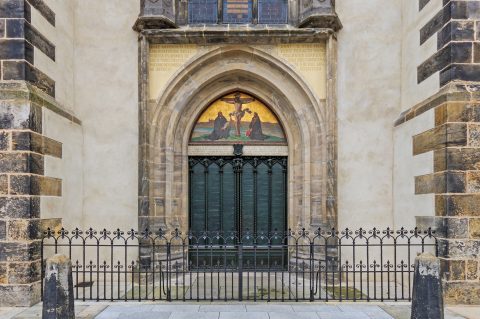
On October 31, 1517, Martin Luther hung a document on the door of the Wittenberg Castle Church. The reality seems simple enough; however, this ordinary looking document made history. It made history because it contained some very unique opinions on the beliefs of the Catholic Church.
The 95 Thesis were simple and provocative. Luther did not post them on the church door in defiance; but rather, he posted them simply to start a discussion. The first two thesis dealt with Luther's belief that believers should seek forgiveness from God rather than men, and that salvation is received by faith through grace alone; it is not something that can be earned through human achievement. The other 93 thesis both supported the first two and condemned the sale of "indulgences," which gave forgiveness of sins.
Martin Luther grew up in a Catholic home and became interested in monastic life at a young age. His parents discouraged this and urged him towards becoming a lawyer, and Luther planned to start law school in autumn of 1505. During the summer he got caught in a violent thunderstorm and after almost being knocked down by lightning, he determined it must be a sign and told God that if he would only be saved from the storm, he would become a monk.
Martin Luther kept his promise to God and days later he turned his back on law school and entered a monastery. However, he did not stop studying; in 1512 he received a doctorate and became a professor of Biblical studies.
Soon Martin began to accept concepts of the late 300s philosopher Augustine, that the Bible, rather than the church, was the ultimate religious authority. He also accepted Augustine's belief that salvation is obtained by grace through faith alone, and not by one's works; when in 1517 the Catholic church started selling indulgences, which provided absolute forgiveness to sinners, Luther penned the famous 95 thesis.
The next year in 1518, the Pope condemned Luther's writings and a commission found them to be "scandalous and offensive to pious ears." 2 years later the pope gave Luther 120 days to recant; Luther refused and was excommunicated. On April 17, 1521 at a church convention Martin again refused to recant, saying "I cannot and will not recant anything, for to go against conscience is neither right nor safe. Here I stand. God help me. I can do no other." Though under a guarantee of safe conduct, the church secretly determined to kill Luther, because "faith need not be kept with heretics." It was only because of the emperor's intervention that Martin got away safely.
Throughout the rest of his life Luther worked to get the doctrines he so firmly believed in to the people, part of the time working secretly in Wartburg Castle to avoid arrest. He successfully translated the New Testament into German and by the time he died in 1546, he had seen Germany influenced by his work and many others step up, continuing the work he begun.
It has been 500 years since Luther nailed his thesis to the door of the Wittenburg Church. The truths Luther discovered were responsible for fracturing the Catholic Church and starting the Protestant Reformation. It is because of these truths that we can have hope, knowing that God has not forsaken us. Let us never forget- and never let this Hope grow dim. We have salvation by grace and faith alone. Here we stand. God help us. We can do no other.
For more information, the documentary Light Unshackled is currently available for free here or at the official website, lightunshackled.com. Light Unshackled is a feature-length, on-location documentary on the Protestant Reformation. It contains stunning footage and powerful stories of the heroes of the Protestant Reformation who shaped the course of history forever. Join presenter Phil Mills, Jr., as we travel through 11 countries to share these inspiring stories.